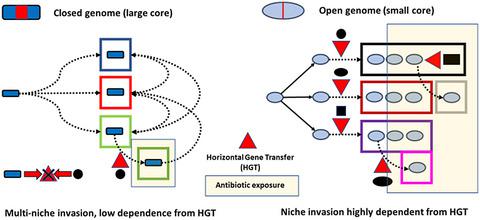当前位置:
X-MOL 学术
›
Mol. Microbiol.
›
论文详情
Our official English website, www.x-mol.net, welcomes your
feedback! (Note: you will need to create a separate account there.)
Ecogenetics of antibiotic resistance in Listeria monocytogenes
Molecular Microbiology ( IF 2.6 ) Pub Date : 2020-03-17 , DOI: 10.1111/mmi.14454 Fernando Baquero 1 , Val F. Lanza 1, 2 , Mélodie Duval 3 , Teresa M. Coque 1
Molecular Microbiology ( IF 2.6 ) Pub Date : 2020-03-17 , DOI: 10.1111/mmi.14454 Fernando Baquero 1 , Val F. Lanza 1, 2 , Mélodie Duval 3 , Teresa M. Coque 1
Affiliation

|
The acquisition process of antibiotic resistance in an otherwise susceptible organism is shaped by the ecology of the species. Unlike other relevant human pathogens, Listeria monocytogenes has maintained a high rate of susceptibility to the antibiotics used for decades to treat human and animal infections. However, L. monocytogenes can acquire antibiotic resistance genes from other organisms’ plasmids and conjugative transposons. Ecological factors could account for its susceptibility. L. monocytogenes is ubiquitous in nature, most frequently including reservoirs unexposed to antibiotics, including intracellular sanctuaries. L. monocytogenes has a remarkably closed genome, reflecting limited community interactions, small population sizes and high niche specialization. The L. monocytogenes species is divided into variants that are specialized in small specific niches, which reduces the possibility of coexistence with potential donors of antibiotic resistance. Interactions with potential donors are also hampered by interspecies antagonism. However, occasional increases in population sizes (and thus the possibility of acquiring antibiotic resistance) can derive from selection of the species based on intrinsic or acquired resistance to antibiotics, biocides, heavy metals or by a natural tolerance to extreme conditions. High‐quality surveillance of the emergence of resistance to the key drugs used in primary therapy is mandatory.
中文翻译:

单核细胞增生李斯特菌抗生素耐药性的生态遗传学
在其他易感生物体中,抗生素抗性的获得过程受物种生态学的影响。与其他相关的人类病原体不同,单核细胞增生性李斯特菌对数十年来用于治疗人类和动物感染的抗生素的敏感性很高。但是,单核细胞增生李斯特氏菌可以从其他生物体的质粒和结合转座子中获得抗生素抗性基因。生态因素可以解释其敏感性。单核细胞增生李斯特菌在自然界无处不在,最常见的是包括未暴露于抗生素的储库,包括细胞内保护区。单核细胞增生李斯特菌拥有非常封闭的基因组,反映了有限的社区互动,较小的种群规模和较高的利基专业化水平。该单增李斯特菌的物种被划分成是专门从事小龛具体,从而减少共存的具有抗生素耐药性的潜在捐助者的可能性变型。种间对抗也阻碍了与潜在捐助者的相互作用。但是,种群数量的偶尔增加(以及因此获得抗生素抗性的可能性)可能源于根据对抗生素,杀生物剂,重金属的固有或获得的抗性或对极端条件的自然耐受性来选择物种。必须对初级治疗中使用的关键药物的耐药性进行高质量的监测。
更新日期:2020-03-26
中文翻译:

单核细胞增生李斯特菌抗生素耐药性的生态遗传学
在其他易感生物体中,抗生素抗性的获得过程受物种生态学的影响。与其他相关的人类病原体不同,单核细胞增生性李斯特菌对数十年来用于治疗人类和动物感染的抗生素的敏感性很高。但是,单核细胞增生李斯特氏菌可以从其他生物体的质粒和结合转座子中获得抗生素抗性基因。生态因素可以解释其敏感性。单核细胞增生李斯特菌在自然界无处不在,最常见的是包括未暴露于抗生素的储库,包括细胞内保护区。单核细胞增生李斯特菌拥有非常封闭的基因组,反映了有限的社区互动,较小的种群规模和较高的利基专业化水平。该单增李斯特菌的物种被划分成是专门从事小龛具体,从而减少共存的具有抗生素耐药性的潜在捐助者的可能性变型。种间对抗也阻碍了与潜在捐助者的相互作用。但是,种群数量的偶尔增加(以及因此获得抗生素抗性的可能性)可能源于根据对抗生素,杀生物剂,重金属的固有或获得的抗性或对极端条件的自然耐受性来选择物种。必须对初级治疗中使用的关键药物的耐药性进行高质量的监测。











































 京公网安备 11010802027423号
京公网安备 11010802027423号